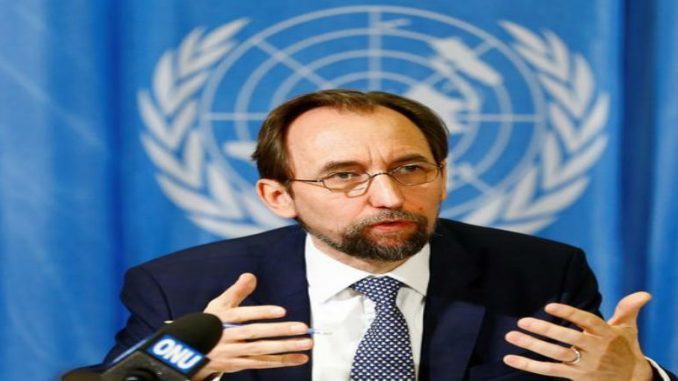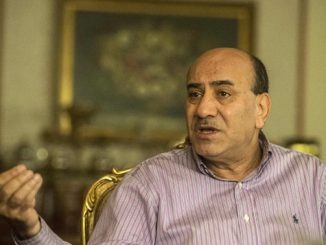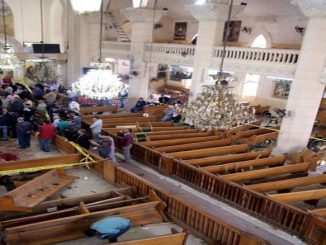
U.N. High Commissioner for Human Rights Zeid Ra’ad al-Hussein said on Monday that heavy-handed security measures by Egypt were fostering the very radicalization it was looking to curb, according to Reuters.
Last month, Egypt was hit by one of the bloodiest attacks in years when Islamic State suicide bombers targeted two Christian churches, killing 45 people.
In response, Abdel Fattah al-Sisi declared a three-month state of emergency hours later.
At a news conference in Geneva, Zeid condemned the church attacks, but he said that Egypt’s approach to combating Islamist militants was exacerbating the problem.
Zeid added, “…a state of emergency, the massive numbers of detentions, reports of torture, and continued arbitrary arrests – all of this we believe facilitates radicalization in prisons.”
He said “the crackdown on civil society” was “not the way to fight terror.”
In response, Egypt’s Foreign Ministry Spokesman Ahmed Abu Zeid called the remarks an “irresponsible” and “unbalanced” reading of the situation in Egypt, where society is targeted by “terrorist operations,” according to a statement from the ministry.
Abu Zeid defended the emergency law as passed by an elected parliament subject to “rules and restrictions” set out by the constitution.
The statement said, “We don’t see the High Commissioner criticizing other states implementing states of emergency that are dealing with similar conditions.”
Al-Sisi, former defense minister,led a military coup against Egypt’s first democratic President Mohamed Morsi. In 2014, al-Sisi was elected in part on a pledge to restore stability to a country, and has sought to present himself as an indispensable bulwark against terrorism in the Middle East.
However, rights groups, say they face the worst crackdown in their history.
Zeid said, “National security yes, must be a priority for every country, but again not at the expense of human rights.”
Last week, the Guardian also wrote,”Al-Sisi has turned what started five years ago as minor local unrest into an Egypt-wide jihadi insurgency.”
It said that al-Sisi’s approach to counter-terrorism has made things worse, not better.
The crackdown on the Muslim Brotherhood, an Islamist organization that is committed to pursue its goals through electoral means, fueled a low-grade insurgency pitting jihadists in Egypt’s strategic Sinai Peninsula against government security forces.
Al-Sisi began cracking down first on the Muslim Brotherhood’s supporters after the military coup in 2013.
When pro-Morsi demonstrators staged a peaceful sit-in in Cairo’s Rabaa al-Adawiya Square on August 14, 2013, to protest Morsi’s ouster, Sisi’s military forces gunned them down and more than 1000 in a single day, and more than 40,000 people are jailed in a crackdown.
Moreover, the German Council on Foreign Relations released a report explaining that “After the crackdown in Rabaa Square, there was a significant change in the insurgency’s rhetoric, behavior, intensity, and scale of operations, as well as in its overall narrative and goals.”
The report quotes one jihadist leader in Sinai linking this directly to Sisi’s repression,”After what happened after the military coup, fighting the armed forces became an urgent necessity,”the leader said.
In 2014, the Sinai jihadists swore allegiance to ISIS. Since then, Sinai militants has led excessive campaign against the Egyptian security forces. Sisi’s repressive response, which has included evicting thousands of families suspected of supporting the jihadists from their homes, has failed to contain and curb the insurgency.
Moreover, the number of terrorist in Egypt between (2014-2016) reached 1,165, according to Al-Ahram Center for Political and Strategic Studies.
In the last quarter of 2016, 104 terrorist operations took place across the country.On October 31, 2015, Sinai Province drowned a Russian passenger airliner, Metrojet Flight 9268,over north Sinai following its departure from the resort town of Sharm el-Sheikh, killing 213.
In addition, ISIS affiliated group also started to target Egypt’s Copts who are one of the oldest Christian communities in the Middle East. They have long complained of discrimination and that the government does not do enough to protect them.
Last December, an Islamic State affiliate claimed a suicide bombing at a Cairo church that killed around 30 people, mostly women, as well as a killing several Christians in northern Sinai that caused hundreds of them to flee to safer areas of the country.In addition to the two recent Church attacks in the beginning of this month.
The latest assault was considered as another challenge to Abdel Fattah al-Sisi, who has pledged to protect the Christians as part of his campaign against extremism.
Al-Sisi’s repressive military regime has actually strengthened jihadists narrative as they have argued that violence was the only way to topple the Middle East dictators.
Jihadists are saying, “You have to listen to us as ballot boxes have no use and what we have been saying all along that all these people understand is violence.”



